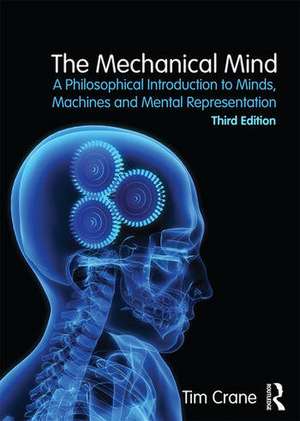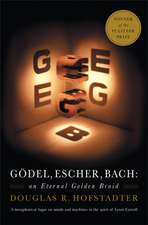The Mechanical Mind: A Philosophical Introduction to Minds, Machines and Mental Representation
Autor Tim Craneen Limba Engleză Paperback – 30 noi 2015
| Toate formatele și edițiile | Preț | Express |
|---|---|---|
| Paperback (1) | 288.00 lei 22-36 zile | +19.70 lei 5-11 zile |
| Taylor & Francis – 30 noi 2015 | 288.00 lei 22-36 zile | +19.70 lei 5-11 zile |
| Hardback (1) | 877.19 lei 43-57 zile | |
| Taylor & Francis – 22 dec 2015 | 877.19 lei 43-57 zile |
Preț: 288.00 lei
Nou
55.13€ • 59.90$ • 46.34£
Carte disponibilă
Livrare economică 31 martie-14 aprilie
Livrare express 14-20 martie pentru 29.69 lei
Specificații
ISBN-10: 1138858358
Pagini: 224
Dimensiuni: 174 x 246 x 18 mm
Greutate: 0.38 kg
Ediția:Revised
Editura: Taylor & Francis
Colecția Routledge
Locul publicării:Oxford, United Kingdom
Public țintă
Postgraduate and UndergraduateCuprins
Recenzii
Praise for previous editions:
"Terrifically useful ... It gives the best simple introduction that I know to the computational theory of the mind." - John Searle, University of California at Berkeley, USA
"Crane deploys his knowledge of the field with a deft touch. ... The writing style is refreshingly vernacular and relaxed, but not to the extent of avoiding technical discussions where these are required for understanding." - Jonathan Knowles, Minds and Machines
"Wonderful and intellectually extremely accessible ... It is the best treatment of the intentionality of the mental that I have yet come across." - David Armstrong, Pysche
"Terrific: both good philosophy and a very useful text ... Wonderful!" - Ned Block, New York University, USA
Descriere
How can the human mind represent the external world? What is thought, and can it be studied scientifically? Should we think of the mind as a kind of machine? Is the mind a computer? Can a computer think? Tim Crane sets out to answer these questions and more in a lively and straightforward way, presuming no prior knowledge of philosophy or related disciplines. Since its first publication, The Mechanical Mind has introduced thousands of people to some of the most important ideas in contemporary philosophy of mind. Crane explains the fundamental ideas that cut across philosophy of mind, artificial intelligence and cognitive science: what the mind-body problem is; what a computer is and how it works; what thoughts are and how computers and minds might have them.
He examines different theories of the mind from dualist to eliminativist, and questions whether there can be thought without language and whether the mind is subject to the same causal laws as natural phenomena. The result is a fascinating exploration of the theories and arguments surrounding the notions of thought and representation. This third edition has been fully revised and updated, and includes a wholly new chapter on externalism about mental content and the extended and embodied mind.
There is a stronger emphasis on the environmental and bodily context in which thought occurs. Many chapters have been reorganised to make the reader's passage through the book easier. The book now contains a much more detailed guide to further reading, and the chronology and the glossary of technical terms have also been updated.
The Mechanical Mind is accessible to anyone interested in the mechanisms of our minds, and essential reading for those studying philosophy of mind, philosophy of psychology, or cognitive psychology.





















